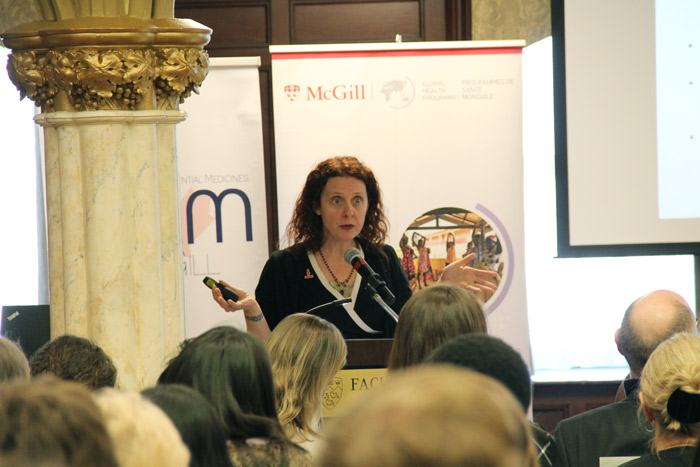The diagnosis and treatment of tuberculosis (TB) remain the top two leading public health challenges of the 21st century. First identified in 1882, mycobacterium tuberculosis is by far the world’s most successful pathogen: One-third of the world's population is infected, with 10.4 million new infections and 1.8 million deaths in 2015. In recognition of the date of its discovery, the World Health Organization (WHO) designated March 24 as World TB Day. The McGill Chapter of Universities Allied for Essential Medicines hosted a conference to commemorate the day.
Tuberculosis is resistant to most antibiotics and can evolve to become resilient to the few drugs that are available to treat it. In addition, its ability to manipulate the human immune response poses a particular challenge to the development of a TB vaccine.
Macrophages are immune cells that engulf and compartmentalize foreign particles, such as bacteria. When they are not able to destroy these particles, multiple macrophages will merge together to partition the particles from the rest of the body. This collection of macrophages, called granulomas, is an ancient mechanism of protection. Following millions of years of co-evolution, mycobacterium tuberculosis uses these granulomas as a source of nutrients and the bacteria’s compartmentalization allows it to effectively hide from the rest of the immune system.
TB is a unique disease in that 90 to 95 per cent of those initially infected do not exhibit any symptoms and 90 per cent of these individuals will never develop active TB. However, with one-third of the world’s population infected, the comparatively minute percentage of active infections represents a huge number of people that require treatment. Moreover, TB is quite contagious.
The current frontline medications against tuberculosis are isoniazid and rifampin. The increase in the number of multiple drug-resistant tuberculosis (MDR-TB) cases has spurred the development and licensing of two new TB drugs: Bedaquiline in 2012 and delamanid in 2014. Their approval for commercial use was met by celebration in the TB treatment community, representing the first and second new TB drugs in over 50 years.
However, current public health policies in most countries have not allowed these drugs to be widely used. Similarly, despite multiple advances in the precision and accuracy of TB diagnostic tests, microscopy smears continue to be the primary test to look for an active infection—the same method Robert Koch used to discover the bacterium more than a century ago.
In the conference held on March 23, Dr. Madhukar Pai, director of the McGill Global Health Program, highlighted the issues surrounding diagnosis.
“Out of 10.4 million active TB patients, only 6.1 million are showing up on the books,” Dr. Pai said. “Most TB patients will go to wherever they’re used to going, such as the local chemist, a sangoma, or a faith healer in the community. There is no TB test at the level of primary care.”
Cultural practices lie at the heart of the issue, and the lack of political will in many TB endemic countries, such as India and South Africa, continue to hinder the progress of proper diagnoses.
“The best test we have currently is the GeneXpert MTB, which is more than 90 per cent accurate,” Dr. Pai said. “However, there is a loss of resistance to its use. It’s more expensive than the smears and people don’t trust it.”
GeneXpert MTB is a molecular test for TB and enables the enhancement of specific DNA fragments. Therefore, it is also able to discern a drug susceptible strain from a multiple drug-resistant strain, bridging the time for MDR-TB patients to receive more aggressive treatment options.
The conference also addressed the gap between the development of new drugs and patient access.
“One the biggest challenges to successful introduction [of bedaqiline and delamanid] has been the incredibly tepid recommendations made by the WHO about the use of the new drugs,” Dr. Jennifer Furin, a lecturer on global health and social medicine at Harvard University, said. “Nowhere in their guidelines do they mention the toxicity and the lack of efficacy of the treatments we use now.”
Indeed, many of the speakers were displeased by the recent actions of the WHO, which has just published a list of priority pathogens for research funding. TB did not make the list.
“I don’t think that the WHO is merely indifferent to TB. I think it’s contempt. I think the WHO and the global health organizations that have been charged with helping people who are suffering from this disease, view them with great contempt,” Dr. Furin said.
The most-cited argument by the WHO against the availability of new drugs has been the fear that their overuse would lead to resistance. But the speakers at the conference voiced a counterargument: Why are we not protecting lives instead?








